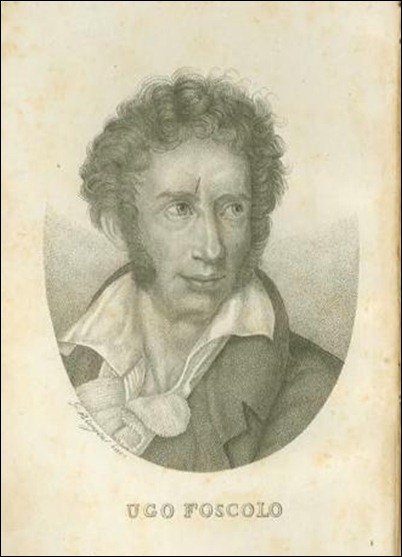Alla Sera di Ugo Foscolo Posted by Serena on Oct 24, 2012 in Uncategorized
Ugo Foscolo, Italian poet, writer, and essayist, was born in 1778 on the Greek island of Zante (Zakynthos), which at that time was part of the Venetian republic. Following his father’s death in 1788, he moved to Venice with his mother and brothers, leaving Zante for ever. Besides being a poet and writer, Foscolo was also a firm Italian patriot, and took part in the Napoleonic wars against the Austrians.
After the restoration of Austrian rule over the north of Italy in 1815, Foscolo fled to Switzerland, where he lived until 1816, when he was granted a British passport. He spent the last years of his life living in London, where he was looked after by his daughter Floriana. He was accustomed to living above his means, and died in poverty in 1827 in Turnham Green. In 1871, after the Unification of Italy, his remains were returned to Italy, and he was buried with State honours in the church of Santa Croce in Florence, alongside the bodies of the other great Italians whom he had celebrated in his ode “Dei sepolcri”.
Ugo Foscolo was both an illuminist and a pre-romantic. As an illuminist he was also an atheist, and believed in “il nulla eterno” (the eternal void). As a pre-romantic he believed in the importance of poetry, of love, and of sentiments. The sonnet “Alla Sera” (to the Evening), published in 1803, perfectly represents his pre-romantic ideals: the poet invokes the evening to come and soothe his pains. But the evening is also a metaphor for death, and as he contemplates the peace that the evening brings upon the world and his life, he also contemplates death, which will dissipate his worries. It’s quite a difficult poem to read because it is written in very poetic and antiquated Italian. Therefore I’ve included some notes below my English translation.
Alla Sera
Forse perché della fatal quïete
tu sei l’immago a me sì cara vieni,
o sera! E quando ti corteggian liete
le nubi estive e i zeffiri sereni,
E quando dal nevoso aere inquïete
tenebre e lunghe all’universo meni
sempre scendi invocata, e le secrete
vie del mio cor soavemente tieni.
Vagar mi fai co’ miei pensier su l’orme
che vanno al nulla eterno; e intanto fugge
questo reo tempo, e van con lui le torme
delle cure onde meco egli si strugge;
e mentre io guardo la tua pace, dorme
questo spirto guerrier ch’entro mi rugge.
To the Evening
Perhaps because of the fatal silence
you are the image I cherish when you come to me,
o evening! and when happily
the summer clouds and the warm breezes court you
or when from the snowy air you lead
restless and long shadows upon the universe
you always descend, invoked by me, and the secret
pathways of my heart you gently hold.
You make me follow with my thoughts in the footsteps
that lead to the eternal void, and meanwhile
this guilty age passes away, and with it the crowds
of cares depart, so that it dissipates with me;
and while I contemplate your peace,
the warrior spirit that roars within me sleeps.
l’immago = the image (standard Italian = l’immagine)
zeffiri = the summer winds
meni = you lead (from the verb menare = ‘to lead’)
reo = guilty
van = they go (standard Italian = vanno)
torme = crowds
onde = so that (not related to the standard Italian onde which means waves)
meco = with me (standard Italian = con me)
egli = the old form of lui = he
ch’entro = that within (standard Italian che dentro)

Build vocabulary, practice pronunciation, and more with Transparent Language Online. Available anytime, anywhere, on any device.





Comments:
andreas:
Salve Serena!
Che bella poesia. E le mie poche conoscenze del latino davvero aiutano a capirla.
Saluti da Andreas